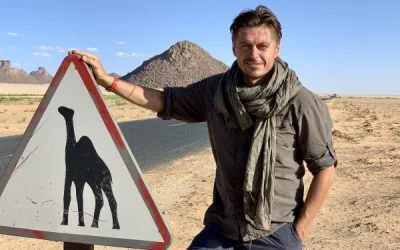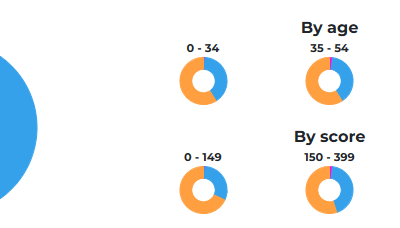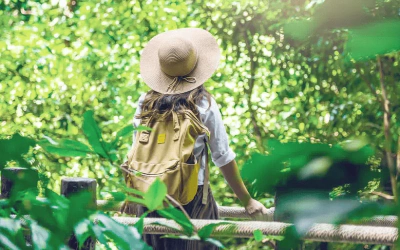As a hub for committed global explorers, the NomadMania community has the unique ability and power to make the world a better place. By being conscious of how your travel impacts the local environment, communities, cultures, and economies you visit, you can help protect the destinations we all love.
Let’s embrace the wonder of travel while also taking action to create a more sustainable and equitable world.
“Responsible tourism is tourism that maximises the benefits to local communities, minimizes negative social or environmental impacts, and helps local people conserve fragile cultures and habitats.”
– Center for Responsible Travel (CREST)
Planning Your Trip
Choose more fuel-efficient flights: Consider using the NERD criteria when flying – Newer air crafts, economy seats, regular medium-sized jets, and direct flights. To help you make more sustainable travel choices, you can find carbon emission estimates on your Google flight search results and booking pages.
Embrace slow travel: When traveling within and between destinations, consider slowing down. This includes taking trains instead of short-haul flights, staying longer in one place, and limiting how many times you switch hotels within a particular city.
Localize your experience: As often as possible, choose locally-owned accommodations, eat at restaurants that source ingredients from the local supply chain, use local tour guides and operators, and purchase handicrafts and goods from local artists and businesses. Tourism Care’s meaningful maps allow you to find sustainable travel experiences more easily.
Use a sustainably-minded booking platform: Choose a booking platform that makes it easier to make more responsible travel choices. Impact Travel Social Club (formerly Impact Travel Alliance) collected 6 sustainable booking platforms and highlighted them in their blog post ‘6 Booking Companies for Sustainable Travel Experiences’.
Ask questions: Hotels and tour operators that are truly working to protect the environment and support the local community will often highlight their sustainability practices on their websites. If they don’t, that doesn’t mean they haven’t implemented any. Don’t be afraid to reach out and ask questions.
While Travelling
Be a good steward: Do your research and learn about the issues facing your destination. During your visit, engage with locals, listen to their stories, and get involved with local initiatives. You will create a richer experience by more deeply connecting with the place. Check out Volunteer Travel: The Pitfalls, The Potential, and How to Get It Right from CREST’s Impact Tourism Handbook.
Be mindful of the resources you use: Use limited resources – such as water, fuel, and electricity – wisely, especially when there is a shortage of a particular resource in a destination (e.g. be mindful of your water consumption in destinations experiencing droughts). Also, consider reducing your reliance on single-use plastics by bringing a reusable water bottle, reusable utensil set etc. The Gold Standard Climate Conscious Travel has additional tips for minimizing your carbon footprint when traveling. has additional tips for minimizing your carbon footprint when traveling.
Practice Leave No Trace Principles: The 7 Principles of Leave No Trace provide an easily understood framework of minimum impact practices for anyone visiting the outdoors, including disposing of waste properly, leaving what you find, and respecting wildlife.
Be culturally aware and sensitive: Familiarize yourself with local culture and customs. Ask for permission before entering sacred places, homes, and private land, and dress appropriately according to local customs.
Be mindful of what you photograph: Always ask for permission before taking photos of individuals. Avoid taking pictures of or with children unless you have permission from a parent or guardian. Engaging Dev outlines best practices for taking photos of people while traveling.
Be wildlife and animal friendly: Stay on designated trails and observe set distances from wildlife (never provoke, touch, or otherwise engage animals). Avoid circumstances and activities that endanger animal welfare. Check out Born Free’s Compassionate Travel Guide and Intrepid Travels Animal Welfare Guidelines for guidance.
After Your Trip
Spread the word: Share your experiences with others and promote responsible practices to your networks on social media. Your friends, family, and co-workers will benefit from learning about your travel choices.
Give back: Consider making a donation to responsible programs that give back to and benefit the local community you visited, especially to those you visited or engaged with.
Offset your emissions: Sometimes it isn’t possible to reduce your emissions as much as you would like. Consider offsetting your emissions after your trip, using a reputable company that verifies its projects. Sustainable Travel International allows you to calculate your emissions and purchase carbon offsets. They distribute each dollar across a mixed portfolio of forestry, energy, and blue carbon projects.
Additional Resources
- Travel Care Code provides travelers with simple guidelines on how they can reduce the impact of their travel on the environment.
- Sustainable Cities is a global storytelling platform to inspire travelers to (re)discover both famous and lesser-known cities, through the ideas and recommendations of travelers and those who call them home.
- Impact Travel Social Club shares stories on how travelers can make mindful choices that empower locals and protect the environment.
- The David Suzuki Foundation offers additional tips on reducing carbon footprint while traveling.
- Find a B Corp Certified business: B Corp Certification is a designation that a business is meeting high standards of verified performance, accountability, and transparency on factors from employee benefits and charitable giving to supply chain practices and input materials.
- RISE Travel Institute is a nonprofit dedicated to inspiring responsible, impactful, sustainable and ethical travel through education. They offer a certificate course and multiple short courses for travelers.
- The Last Tourist documentary – For 3 years, the filmmakers took a journey to 14 different countries to interview dozens of leading travel experts, tour operators, academics, as well as travelers and service workers in host communities who are leveraging tourism to improve their quality of life.
- Insider Article | I’m planning a trip to Japan. Sustainability experts reviewed my itinerary and shared 9 fixes to make it a more eco-conscious vacation
Responsible travel tips and resources brought to you by Center for Responsible Travel (CREST).
You can download these tips as a pdf here. Enjoy and happy travels.






